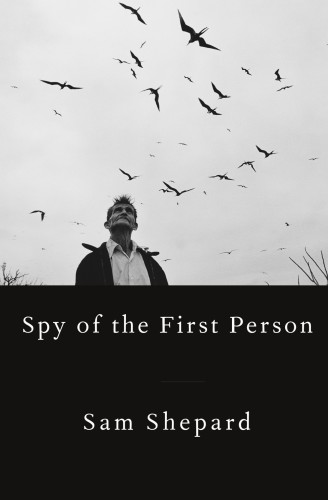
Spy of the First Person
کتاب های مرتبط
- اطلاعات
- نقد و بررسی
- دیدگاه کاربران
نقد و بررسی

November 15, 2017
A sharply observed, slender novel set in familiar Shepard (The One Inside, 2017, etc.) territory: a dusty, windblown West of limitless horizons and limited means of escape.An image at the beginning of what is billed as the recently deceased Shepard's final work of fiction--until the next one is found in a drawer, presumably--offers arresting portent: robins are singing, chirping away, not so much out of happiness with the world but, as the nameless narrator says, "I think mostly protecting nests" from all the "big bad birds" that are out to get their little blue eggs. The world is full of big bad birds, and one is the terror of a wasting neurological disease that provides the novel's closing frame: two sons and an ailing father lagging behind the rest of their family as they make their way up the street in a little desert ville. "We made it and we hobbled up the stairs," says the old man. "Or I hobbled. My sons didn't hobble, I hobbled." It's exactly of a piece with True West and other early Shepard standards, and one can imagine Shepard himself playing the part of that old man in an understated, stoical film. In between, it's all impression, small snapshots of odd people and odd moments ("People are unlocking their cars from a distance. Pushing buttons, zapping their cars, making the doors buzz and sing, making little Close Encounters of the Third Kind noises"). It's easy to lose track of where one voice ends and another begins, where the young man leaves off and the old man picks up the story: explaining the title, the young narrator likens himself to an employee of a "cryptic detective agency," even as the old man, taking up the narration in turn, wonders why he's being so closely watched when he can barely move. In the end, this is a story less of action than of mood, and that mood is overwhelmingly, achingly melancholic.The story is modest, the poetry superb. A most worthy valediction.
COPYRIGHT(2017) Kirkus Reviews, ALL RIGHTS RESERVED.

Starred review from January 29, 2018
This slim but potent volume, which playwright Shepard (The One Inside) finished shortly before his death in 2017, alternates two voices in a poignant, unsettling double monologue. One narrator is a man who spends most of his time sitting in a “rocking chair that looks like it was lifted from a Cracker Barrel” on the porch of a house in the Southwest, and who occasionally makes family outings to a local Mexican restaurant or to a prestigious medical clinic founded by two brothers from Minnesota. On the porch, he talks to himself, or to his son, recalling events they shared or didn’t. Across the road, someone else observes him, trying to make sense of him. The observer watches the porch sitter eat cheese and crackers and notes dispassionately that “his hands and arms don’t work much,” while the sitter himself prefers to dwell in the past, since the present has little to offer. Elegant, unpretentious, funny, and touching without demanding sympathy, the book, edited with the help of Shepard’s friend Patti Smith (Just Kids), gently escorts the reader out to the edge where life meets death.

Starred review from November 15, 2017
Early in 2017, Shepard, the author of 55 gutsy and imaginative plays and three transporting short story collections, published his first novel, The One Inside; he then died that summer after a long battle with ALS. Now, just before the year closes, his final work of fiction, written in the grip of that debilitating disease, appears. A meshing of memoir and invention, it snares with virtuoso precision both nature's constant vibrancy and the stop-action of illness. Told in short takes pulsing with life and rueful wit, it portrays one man spying on another from across the street, raising binoculars to better watch his subject struggling to make the simplest motions and family members appearing from within the house to offer help and company. As for the nearly immobilized man, he is remembering his immigrant mother, a troubling night in New York City, and visits to a famous Arizona clinic in pursuit of a magic cure. He also offers acid commentary on episodes in American history, and revels in the resonance of words. Gradually the spy and the man on the porch merge, and the resilient yet reconciled narrator celebrates family love beneath a full moon in the farewell beauty of twilight. A gorgeously courageous and sagacious coda to Shepard's innovative and soulful body of work.(Reprinted with permission of Booklist, copyright 2017, American Library Association.)

























دیدگاه کاربران